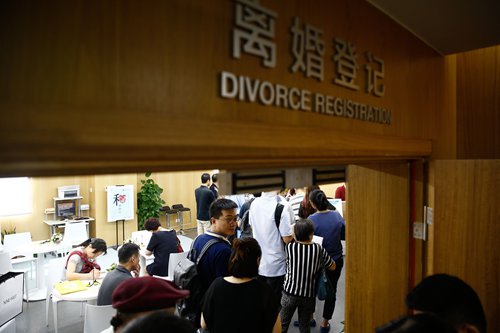
Chinese couples queue up to divorce at a divorce registration office in Shanghai, 29 August 2016. Photo: IC
"I can help you to marry a local if you want to buy a house," an agent told a Global Times reporter posing as a wannabe Shanghai homeowner who lacks a local household registration, or hukou.
Dealers who offer fake marriage services can be found on many social media platforms, such as QQ, Wechat and Sina Weibo.
"I've been doing this business for years, nothing has ever gone wrong. You just need to sign a contract before getting married," the agent surnamed Jin assured the reporter.
Many first-tier cities have policies which say only local hukou holders are allowed to buy residential properties, leaving many migrants out in the cold unless they marry a local.
Falling in and out of love is not what determines whether a couple marry or divorce in many cases today, instead property rules are the deciding factor. Couples risk getting a divorce or marrying a stranger who happens to have a particular hukou in order to get their hands on their own little piece of a Chinese metropolis.
'Unspoken rule'
The agent told the Global Times the whole process can be finished in around eight months - after purchasing the house, the "couple" can divorce immediately, and then transfer the ownership permit, which usually takes up to six months to register.
"I can find you good Shanghai men. I only do introductory business. I, myself, also offer 'fake marriage' services. I just married a girl a few months ago," he said.
The mirror image of the migrants who marry locals for property rights are the locals who divorce to take advantage of favorable policies for first-time buyers.
Getting a temporary divorce to avoid high mortgage rates and taxation is an "unspoken rule" of the real estate market of cities that have property purchasing restrictions, like Shanghai and Beijing, Hui Jianqiang, research director with real estate information provider Beijing Zhongfangyanxie Technology Service, told the Global Times.
When a couple divorces, the partner who does not retain ownership of any jointly-owned real estate can enjoy favorable policies open to first-time buyers such as smaller down payments and lower interest rates. Couples then remarry after the second home is purchased.
Hui said using these loopholes on loans that can amount to millions of yuan can save ordinary families a significant amount of cash.
Local government data shows the scale of this trend. A total of 97,600 couples got divorced in Beijing in 2016, a 73 percent increase over 2014. But over 22,000 couples remarried their former spouses in 2016, a 131 percent rise compared to 2014.
Marriage not sacred
Society no longer sees fake marriages or divorces as "humiliating" and has even become accustomed to them, experts warned.
"Marriage is fragile now and gives way when it comes to reality. While before marriage was sacred and divorce is the last thing you would consider," Xia Xueluan, a professor of sociology at Peking University, told the Global Times.
"It's a risky game to play. Legally speaking, fake divorces don't exist. The reasons for divorcing damage social order and rules," Xia said.
Fake marriage or divorce is eroding traditional Chinese family values, Xia warned, saying "divorce used to be very humiliating for couples, even for their community."
Unsurprisingly, some fake divorces become real. A couple in Yinchuan, Northwest China's Ningxia Hui Autonomous Region divorced to get a good deal on a house. But the woman refused to remarry her husband after she took possession of the new property, local news paper the Ningxia Daily reported recently.
These policies have made marriage more materialistic, Zhou Xiaozheng, a professor of sociology at the Renmin University of China, told the Global Times.
"When people are under pressure from overpriced housing, loopholes are their only way out," Zhou said, adding that the authorities should enact people-oriented policies to curb this trend.
Beijing launched a policy to cool its real estate market in March 2017 which says those who have been divorced for less than a year are not eligible for cheap mortgages.
According to the People's Bank of China the fake divorce phenomena has "hurt the effects of house regulation and increased the house loan risks at commercial banks."
There is no public data which shows if this policy has had any effect yet. But experts interviewed by the Global Times believe the policy will be a success.
Wu Jiezhen, a Guangdong-based lawyer suggested that marriage should be linked to credit assessment. "Marriage and property registration can be linked with bank credit ratings to caution those who frequently get married, divorced or buy property," Wu was quoted by the Economic Information Daily as saying.

